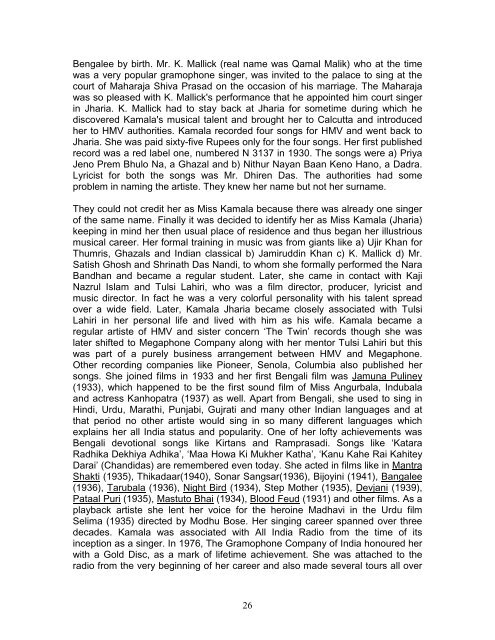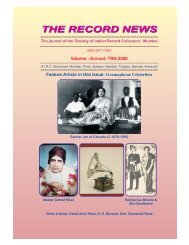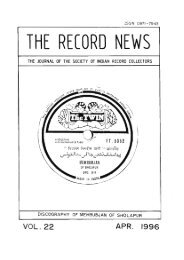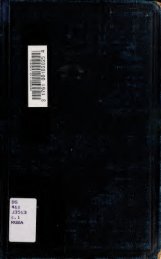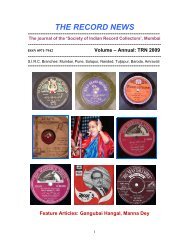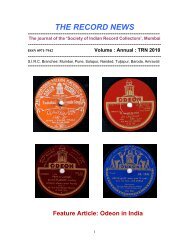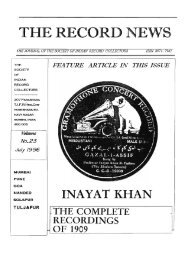THE RECORD NEWS - The Digital South Asia Library - University of ...
THE RECORD NEWS - The Digital South Asia Library - University of ...
THE RECORD NEWS - The Digital South Asia Library - University of ...
Create successful ePaper yourself
Turn your PDF publications into a flip-book with our unique Google optimized e-Paper software.
Bengalee by birth. Mr. K. Mallick (real name was Qamal Malik) who at the time<br />
was a very popular gramophone singer, was invited to the palace to sing at the<br />
court <strong>of</strong> Maharaja Shiva Prasad on the occasion <strong>of</strong> his marriage. <strong>The</strong> Maharaja<br />
was so pleased with K. Mallick's performance that he appointed him court singer<br />
in Jharia. K. Mallick had to stay back at Jharia for sometime during which he<br />
discovered Kamala's musical talent and brought her to Calcutta and introduced<br />
her to HMV authorities. Kamala recorded four songs for HMV and went back to<br />
Jharia. She was paid sixty-five Rupees only for the four songs. Her first published<br />
record was a red label one, numbered N 3137 in 1930. <strong>The</strong> songs were a) Priya<br />
Jeno Prem Bhulo Na, a Ghazal and b) Nithur Nayan Baan Keno Hano, a Dadra.<br />
Lyricist for both the songs was Mr. Dhiren Das. <strong>The</strong> authorities had some<br />
problem in naming the artiste. <strong>The</strong>y knew her name but not her surname.<br />
<strong>The</strong>y could not credit her as Miss Kamala because there was already one singer<br />
<strong>of</strong> the same name. Finally it was decided to identify her as Miss Kamala (Jharia)<br />
keeping in mind her then usual place <strong>of</strong> residence and thus began her illustrious<br />
musical career. Her formal training in music was from giants like a) Ujir Khan for<br />
Thumris, Ghazals and Indian classical b) Jamiruddin Khan c) K. Mallick d) Mr.<br />
Satish Ghosh and Shrinath Das Nandi, to whom she formally performed the Nara<br />
Bandhan and became a regular student. Later, she came in contact with Kaji<br />
Nazrul Islam and Tulsi Lahiri, who was a film director, producer, lyricist and<br />
music director. In fact he was a very colorful personality with his talent spread<br />
over a wide field. Later, Kamala Jharia became closely associated with Tulsi<br />
Lahiri in her personal life and lived with him as his wife. Kamala became a<br />
regular artiste <strong>of</strong> HMV and sister concern ‘<strong>The</strong> Twin’ records though she was<br />
later shifted to Megaphone Company along with her mentor Tulsi Lahiri but this<br />
was part <strong>of</strong> a purely business arrangement between HMV and Megaphone.<br />
Other recording companies like Pioneer, Senola, Columbia also published her<br />
songs. She joined films in 1933 and her first Bengali film was Jamuna Puliney<br />
(1933), which happened to be the first sound film <strong>of</strong> Miss Angurbala, Indubala<br />
and actress Kanhopatra (1937) as well. Apart from Bengali, she used to sing in<br />
Hindi, Urdu, Marathi, Punjabi, Gujrati and many other Indian languages and at<br />
that period no other artiste would sing in so many different languages which<br />
explains her all India status and popularity. One <strong>of</strong> her l<strong>of</strong>ty achievements was<br />
Bengali devotional songs like Kirtans and Ramprasadi. Songs like ‘Katara<br />
Radhika Dekhiya Adhika’, ‘Maa Howa Ki Mukher Katha’, ‘Kanu Kahe Rai Kahitey<br />
Darai’ (Chandidas) are remembered even today. She acted in films like in Mantra<br />
Shakti (1935), Thikadaar(1940), Sonar Sangsar(1936), Bijoyini (1941), Bangalee<br />
(1936), Tarubala (1936), Night Bird (1934), Step Mother (1935), Devjani (1939),<br />
Pataal Puri (1935), Mastuto Bhai (1934), Blood Feud (1931) and other films. As a<br />
playback artiste she lent her voice for the heroine Madhavi in the Urdu film<br />
Selima (1935) directed by Modhu Bose. Her singing career spanned over three<br />
decades. Kamala was associated with All India Radio from the time <strong>of</strong> its<br />
inception as a singer. In 1976, <strong>The</strong> Gramophone Company <strong>of</strong> India honoured her<br />
with a Gold Disc, as a mark <strong>of</strong> lifetime achievement. She was attached to the<br />
radio from the very beginning <strong>of</strong> her career and also made several tours all over<br />
26


